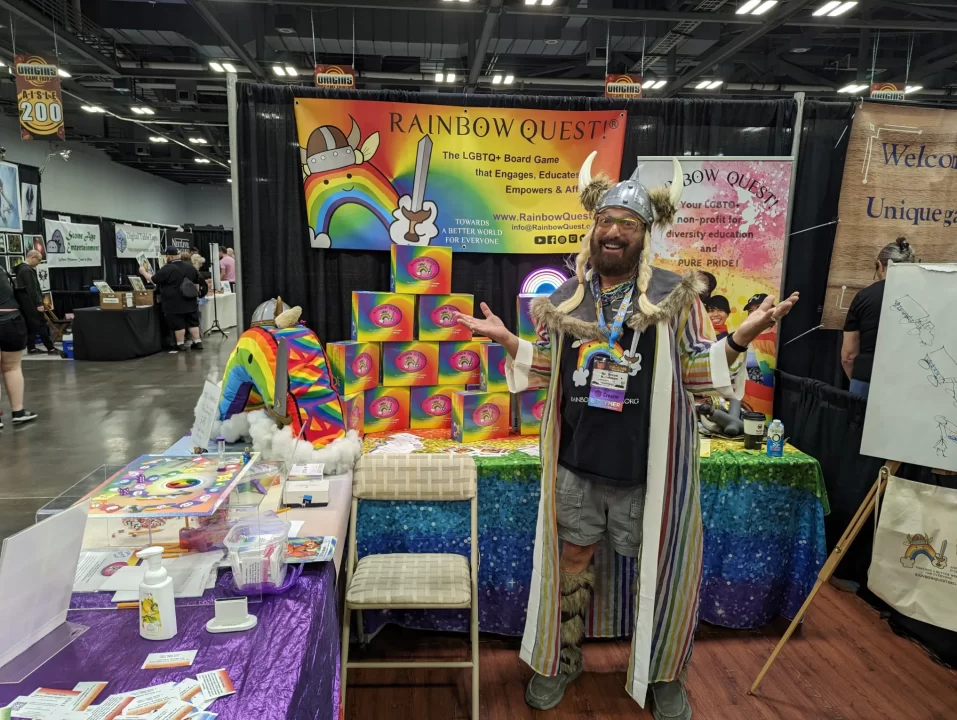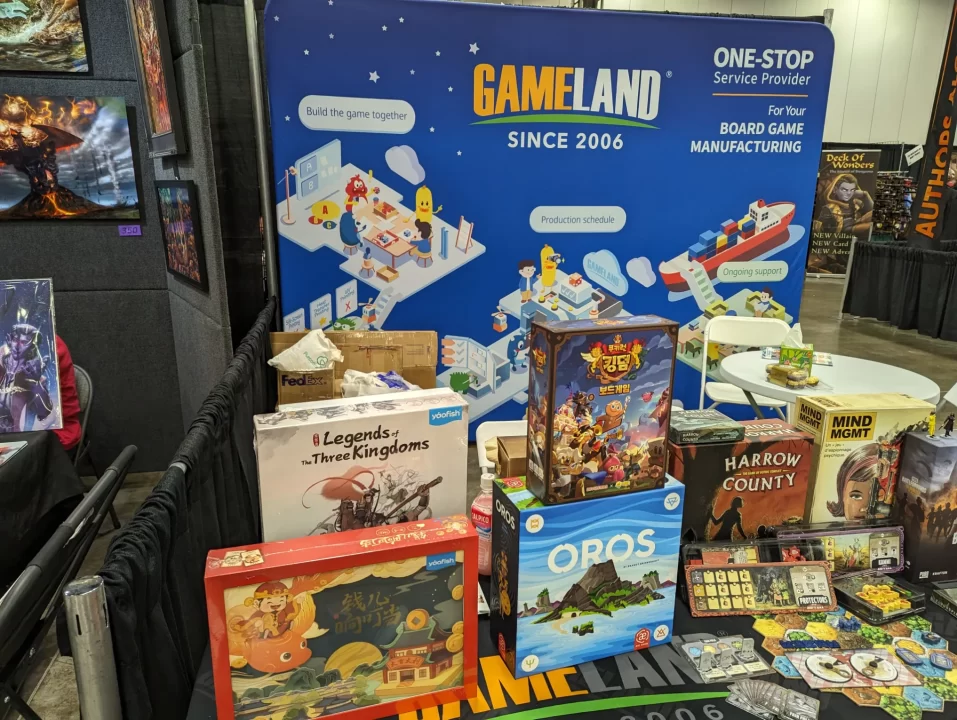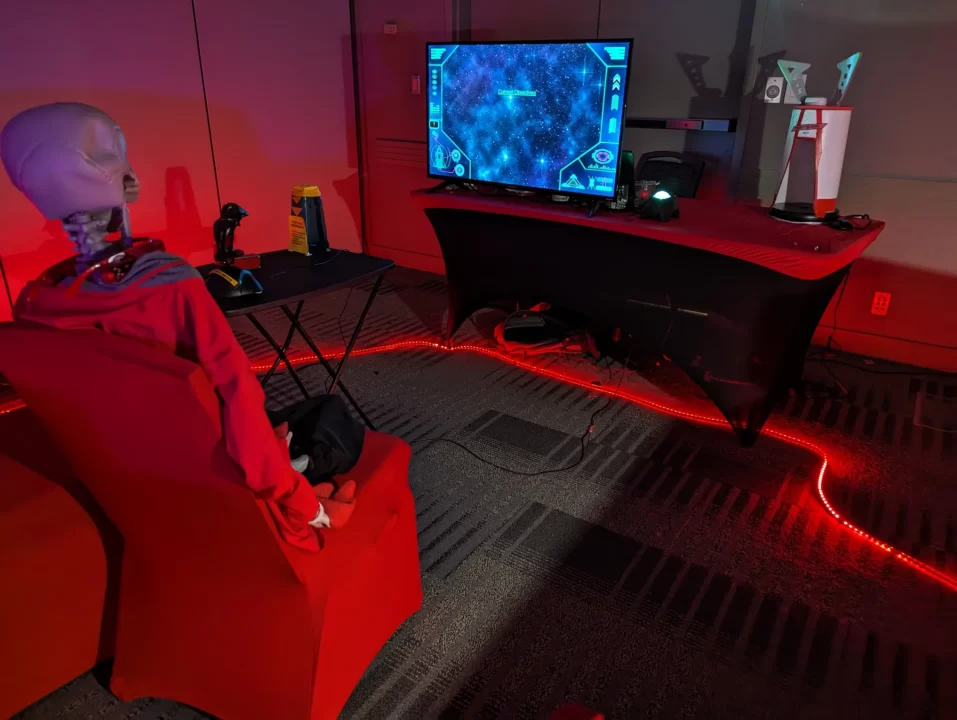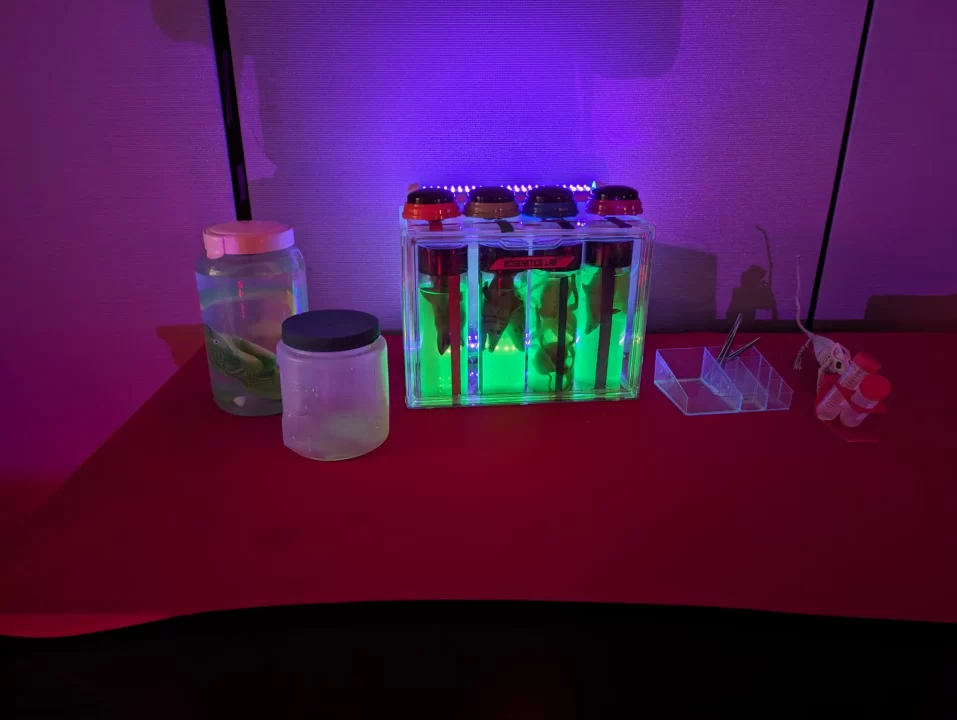Do you enjoy tea? What about escape rooms? Interested in the logistics of actually manufacturing a game? What about LGBT non-profits and queer friends who play and make games? Origins has all of that and more.
Tea Punk Teas
In years past when we’ve covered Origins, we discussed the odd and novel businesses surrounding soaps so players can smell like their characters and tins with herbs in them for an odorific atmosphere during role-playing sessions. What about sipping tea reminiscent of Malenia or a dragon you’ve smitten—or been smitten by? Tea Punk Teas has you covered, and we were impressed by their catalog of wares. On the pricier side, without question, these blends smelled the part. We didn’t get a chance to sample their work, but their alchemist assured me that taste came first, then the name. They also have a light-hearted game about biscuits to go with the tea, and while we had a good time with it, it’s certainly on the extremely lighter side of complexity.
Escape Rooms
Imagine showing up to an escape room that always seemed to have a line in front of it so that you could chat with its designer, only to be questioned about why you’re covering Origins when “RPGFan only covers video games.” David Welch’s Boot Hill Heroes earned a respectable 70% from us back in 2014, and he never forgot. Filled with appreciation and handshakes, we caught up with him about his sci-fi escape room that leans heavily toward riddles, technology, and teamwork.
While Origins is ostensibly about tabletop, miniatures, and D&D-style RPGs, escape rooms have been a constant presence at the event, and Welch has found enough success going from convention to convention to quit his day job and become a full-time escape room designer. His work differs from any other escape room I’ve done, though, as his relies heavily on computers that look a great deal like those in Star Trek. While players meaningfully impact the room with their screens alone, some back-end stuff takes place, such as Welch updating the tech when players place something in a transmogrifier. We didn’t get to sample the room ourselves, but if his stated success and the line of people we always saw seated outside of a closed door are any indication, escape rooms are here to stay at Origins.
If you’re interested in more of what David Welch has been up to, he’s currently working on an outdoor escape room in the style of Shadowgate. Something more in line with what we do here at RPGFan, he also has an escape room called Cabin of the Cackling Man, which is about a cursed retro video game reminiscent of The Legend of Zelda, which we absolutely cover.

Inclusivity
We also met two LGBTQ+-centric booths in the exhibitor hall, one with a non-profit group offering resources on inclusivity in a variety of arenas, and another—Rainbow Quest—designers of a trivia game akin to roll-and-move games of yore. Tabletop Gaymers is a non-profit organization that seeks to promote inclusivity and visibility. Their booth at Origins certainly had a wealth of information, and I picked up a few fliers for my own education and to help me learn how to set up a gaming safe space for students I work with.
What struck me about Rainbow Quest was its emphasis on stimulating candid conversations without shaming would-be allies or queer folk in case something was lost in the details. After speaking with Dr. Brian Kaufman, Ph.D. in Industrial-Organization Psychology, it became clear to me that his goal with his game, which he has worked on for decades over several iterations, is to educate and affirm. Too often, those curious are scared to engage in difficult conversations, and with Rainbow Quest, those worries melt away as inquiry is its core. When I asked what he plans to do about the ever-changing vocabulary and nuance around topics discussed in the game, he said he wasn’t sure yet. Making another edition feels bad, because it pressures people to buy a whole new copy. He thought offering a printable PDF online might do the trick, but he also said that he hasn’t received one complaint about his game, including older editions that refer to “the other gender.” I think an entertaining resource like this earns its keep by injecting something positive into the world, even if a few of the cards may no longer be accurate.

Production
Are you an aspiring game designer who wants to avoid publishers? Are you curious about developing a game, but find the entire process a daunting prospect? For the first time I’ve noticed at Origins, manufacturers and companies who support crowdfunding endeavors were present to show off what they’ve done for several successful titles. Hive Interactive offers assistance to Kickstarter creators, which is more important than you might think. What makes a successful Kickstarter campaign requires a variety of touches that may not be intuitive to someone who just wants to make a fun game; I’ve had such conversations with board game designers, miniature developers, and even successful business owners. Specifics and pricing structures are clearly defined on their website, so if you anticipate needing help getting your project off the ground, they appear to be well-connected with a history of victories for independent projects.
Similar, but in a bit of a different direction, GameLand was set up at the event as well, and they handle manufacturing and production. Since 2006, GameLand has helped several projects get off the ground with relatively complex designs (like layered cardboard wheels to track resources). Having gotten a chance to get my hands on some of their work at Origins, the quality is either without comparison or as one would expect. Miniatures, plastic vehicles, metal dice with a satisfying weight, and intricately engraved coins—whatever you want, it seems like they can do it. Communication and working with designers during the lengthy manufacturing process seem to be GameLand’s chief priorities, as well, because while making good components that reflect a developer’s vision is important, it all falls apart if something goes amiss from idea to shipping.





